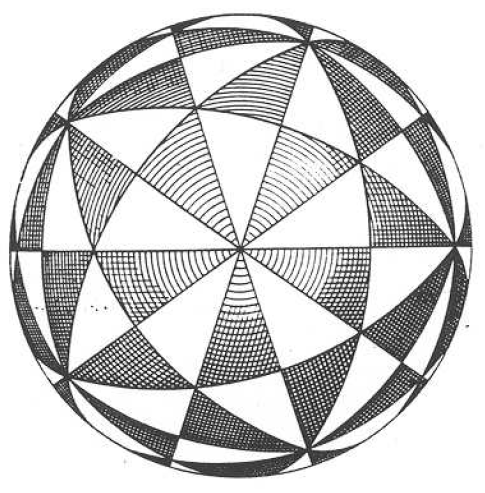Problem
Evaluate
\[I=\int_0^\frac{\pi}{2}\frac{\left\{\tan(x)\right\}}{\tan(x)}\,\mathrm dx\]where $\left\{x\right\}$ denotes the fractional part of $x$.
Solution
First let $x=\text{arctan}(u)$ so that
\[I=\int_0^\infty\frac{\left\{u\right\}}{u(1+u^2)}\,\mathrm du\]then expand the integral into an infinite series as follows,
\[\begin{align*}I &=\int_0^\infty\frac{u-\left \lfloor u \right \rfloor}{u(1+u^2)}\,\mathrm du \\ &=\sum_{n=0}^\infty\int_n^{n+1}\frac{u-\left \lfloor u \right \rfloor}{u(1+u^2)}\,\mathrm du \\ &=\sum_{n=0}^\infty\int_0^1\frac{u+n-\left \lfloor u+n \right \rfloor}{(u+n)(1+(u+n)^2)}\,\mathrm du,\,u\mapsto u+n \\ &=\int_0^1 u\sum_{n=0}^\infty\frac{1}{(u+n)(1+(u+n)^2)}\,\mathrm du \\ &= \int_0^1 u\sum_{n=1}^\infty\left( \frac{1}{n-1+u}-\frac{1}{2(n-1+u+i)}-\frac{1}{2(n-1+u-i)}\right )\,\mathrm du \\ &= \int_0^1 u\left(\frac{1}{2}\psi(u+i)+\frac{1}{2}\psi(u-i)-\psi(u)\right)\,\mathrm du\tag{1}\end{align*}\]where in the last line we’ve used the series
\[\psi(1+z)=-\gamma+\sum_{n=1}^\infty\left(\frac{1}{n}-\frac{1}{n+z}\right)\]for the digamma function. The integrals in $(1)$ are readily done by parts to get
\[\begin{align*}\int_0^1 u\psi(u)\,\mathrm du &=-\int_0^1\ln(\Gamma(u))\,\mathrm du \\ &= -\frac{1}{2}\ln(2\pi),\tag{2}\end{align*}\]the detail for this is shown here. For the remaining two integrals we have
\[\begin{align*}\int_0^1 u\psi(u+\alpha)\,\mathrm du &= [u\ln(\Gamma(u+\alpha))]|_0^1-\int_0^1\ln(\Gamma(u+\alpha))\,\mathrm du \\ &= \ln(\Gamma(\alpha+1))-\int_0^1\ln(\Gamma(u+\alpha))\,\mathrm du\end{align*}\]and
\[\begin{align*}\int_0^1\ln(\Gamma(u+\alpha))\,\mathrm du &=\int_\alpha^{\alpha+1}\ln(\Gamma(u))\,\mathrm du \\ &=\int_0^1\ln(\Gamma(u))\,\mathrm du+\int_1^{\alpha+1}\ln(\Gamma(u))\,\mathrm du-\int_0^\alpha\ln(\Gamma(u))\,\mathrm du \\ &=\frac{1}{2}\ln(2\pi)+\int_0^\alpha\ln(\Gamma(u+1))\,\mathrm du-\int_0^\alpha\ln(\Gamma(u))\,\mathrm du \\ &=\frac{1}{2}\ln(2\pi)+\int_0^\alpha\ln\left(\frac{\Gamma(u+1)}{\Gamma(u)}\right)\,\mathrm du \\ &= \frac{1}{2}\ln(2\pi)+\int_0^\alpha\ln(u)\,\mathrm du \\ &= \frac{1}{2}\ln(2\pi)+\alpha\ln(\alpha)-\alpha.\end{align*}\]So
\[\begin{align*}\int_0^1 u\psi(u+\alpha)\,\mathrm du &=\ln(\Gamma(\alpha+1))-\frac{1}{2}\ln(2\pi)-\alpha\ln(\alpha)+\alpha. \tag{3}\end{align*}\]Using $(2)$ and $(3)$ on $(1)$ tells us that
\[I=\frac{1}{2}\ln(\Gamma(1+i)\Gamma(1-i))+\frac{\pi}{2}.\]Recognizing that the product of gamma functions may be written as $i\Gamma(i)\Gamma(1-i)$ and applying the reflection formula gives the much nicer closed form
\[\int_0^\frac{\pi}{2}\frac{\left\{\tan(x)\right\}}{\tan(x)}\,\mathrm dx=\frac{1}{2}\ln(\pi\text{csch}(\pi))+\frac{\pi}{2}.\]An afterthought: I realized that this proof can be made much simpler — in the sense that the digamma functions and log-gamma integrals can be avoided — by using a method similar to what I used to solve AMM12338. But I’ll the leave the post as it is in case I want to reference these log-gamma integrals in the future.
